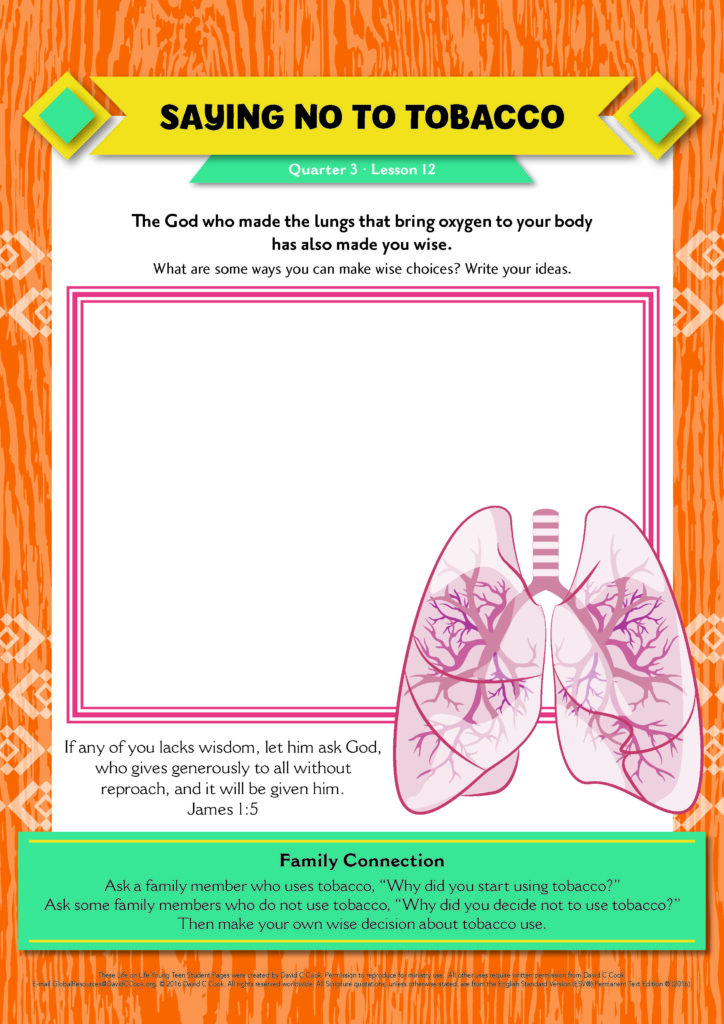During the lesson, the information for you to know is written in regular type, and what we suggest speaking or reading aloud to children is in bold. All resources for this lesson, including the Teacher Guide, Student Page, Family Connection Card, and other resources can be downloaded in a ZIP file by clicking on the following link:
In some lessons you will find "resource articles." These are articles written by experts from around the world to help equip you for your work with children and adolescents. Share them with parents or guardians if you consider it appropriate.
If any of you lacks wisdom, you should ask God, who gives generously to all without finding fault, and it will be given to you.
James 1:5
God is the only source of true wisdom. His understanding and knowledge are infinite. His choices are always perfect. Even when we do things to harm ourselves, God can give us the wisdom to honour ourselves as He does. As you prepare to teach your students how wisdom can help them to make wise choices about their bodies, consider the wisdom God has given you. Where does your life reflect the truths of His love and glory? Do you honour Him with your own wise choices? Do you need His help to make an important decision? Do you need Him to give you wisdom in a difficult relationship? Do you need His guidance as you minister to 1 of the students in your class?
When you ask God for wisdom, He will give it generously. Ask Him now, and continue to ask Him every day. You may begin to notice a change. Your thoughts will become more like God’s. He will broaden your understanding of situations and relationships. He will give you eyes to see and ears to hear what is good and true and wise—so you will begin to see the world as He does.
Encourage the students to ask their family members who use tobacco, “Why did you decide to start using tobacco?” They can also ask their family members who do not use tobacco, “Why did you decide not to use tobacco?”They can use this information to help them make wise decisions about tobacco use.
Teacher Tip: If possible, email or text the Family Connection Card to the families of your students.
Greet your students warmly as they arrive. As they arrive, ask them to share silly stories or jokes with you and others in the group. Remember which students have particularly humorous stories and jokes so you can call on them in the next activity. Once all the students have arrived, gather the class together for the lesson.
Begin class by sharing your own silly story or joke with the students. Laugh and encourage the students to laugh with you! Then choose 1–2 students who shared particularly humorous stories or jokes and have them share their stories with the whole group.
Divide the students into 4 equal groups. Encourage them to share silly stories and jokes with each other. Give them 3–4 minutes for this activity.
Those were silly stories and jokes! We did a lot of laughing! Did you know that laughing is good for you? In fact, it improves your immune system, which helps you to fight off sickness.
When you laugh, you use your lungs. When you breathe in, your lungs transport oxygen to your bloodstream and collect carbon dioxide, which is then exhaled. Here are some other interesting facts about your lungs.
Even when you try to exhale all of your breath, your lungs will still retain about 1 litre of oxygen. Try it now!
Allow students to try to exhale all of the oxygen in their lungs. They should try this a few times. No matter how hard they try, if they try again, they will be able to exhale a little bit more.
God made your lungs so useful and amazing! Your lungs allow you to breathe, hiccup, talk, and laugh.
Students may suggest diseases, exposure to damaging chemicals, or smoking.
People sometimes get infections, such as pneumonia and tuberculosis, which can damage their lungs. Jobs such as farming, mining, and manufacturing can also damage people’s lungs. People with jobs like these may breathe in harmful chemicals or smoke, which eventually may cause their lungs to lose function. One of the most damaging things you can breathe in is tobacco smoke. Smoking narrows the air passages in your lungs and destroys your lung tissue. Let’s talk more about how smoking can damage your body—especially your lungs.
Ask students to gather on 1 side of your teaching space.
I will read some facts about how tobacco can damage your body. As I read each statement, you can stay where you are to show that you already knew this fact about tobacco. If you did not know the fact, take 1 large step forward.
If you smoke, you are not only hurting yourself. Everyone around you who breathes the smoke can be harmed.
You probably know some people who use tobacco. Maybe you struggle with an addiction to it—or maybe you want to try it. Lots of people use tobacco. In some countries and cultures, using tobacco is normal behaviour. Many people do not even think about the negative effects. They use tobacco because everyone else does.
When you make decisions about caring for your body—or anything else—you should always make wise choices. You should let wisdom guide your decisions instead of doing what everyone else does. God made you wise—and you can use that wisdom to do what is best for you and for others.
Ask the students to find partners and share their answers with their partners. Then allow each pair to share an answer with the group.
Wisdom is the ability to understand a situation well and to follow the best course of action. Wisdom is not the same as being smart or intelligent, though it is possible to be both wise and intelligent. Wisdom goes deeper than just the knowledge in our brains. It is the ability to use our understanding and knowledge to make good choices. A wise person thinks about the consequences of a choice before deciding how to act.
Give students time to share ideas with their partners. Then ask for 3 volunteers to share their partners’ ideas with the class.
There is a difference between knowing something in your brain and using that knowledge to help you make a good choice. Every choice we make has a consequence. Choosing not to use tobacco takes more than just knowledge—it takes wisdom.
Ask a student to read Romans 12:1–2 aloud from the Bible.
Therefore, I urge you, brothers and sisters, in view of God’s mercy, to offer your bodies as a living sacrifice, holy and pleasing to God—this is your true and proper worship. Do not conform to the pattern of this world, but be transformed by the renewing of your mind. Then you will be able to test and approve what God’s will is—his good, pleasing and perfect will.
Romans 12:1–2
This passage tells us that we need to test everything in life in order to decide what is right and what is wrong. If you have ever tried a new food for the first time, you probably tried a small taste before taking a bigger bite. The same is true of the words we hear from others. It is unwise to immediately believe everything we hear. For example, you may know a lot of people who smoke and think you should, too. But you should always use wisdom in making your own decisions about smoking—you should not just do what others do or say.
Guide the students to understand that this verse calls us to present our bodies as holy and living sacrifices to God. So when we take care of our health, we honour Him. The verse also teaches us that we should not make decisions based on worldly standards but instead seek God’s wisdom and live in a way that is pleasing to Him.
Have a student read James 1:5 aloud from the Bible.
If any of you lacks wisdom, you should ask God, who gives generously to all without finding fault, and it will be given to you.
James 1:5

Ask God for wisdom.
Divide students into groups of 3–5.
Each group will create and perform a skit in which someone is tempted to use tobacco, alcohol, or drugs. As you plan your skit, talk with your group about situations you have experienced or witnessed. Maybe a friend has pressured you to take drugs. Maybe you wanted to try drinking alcohol because you wanted to know what it felt like to be drunk. Maybe you have been tempted to smoke cigarettes because your father smokes. As a group, decide on a situation to act out. The ending of the skit can show a wise decision or an unwise decision.
Give students about 5 minutes to plan and practice their skits. Then have each group perform their skit. Affirm each group, pointing out something specific they did well. After each skit, ask the following questions.
Optional: If you are using the Student Pages, have the teens use them to write ideas to help them make wise choices.

It can be difficult to make wise choices. It can be difficult to make our own decisions when everyone around us is making a different decision. But doing things because everyone else does them is not wise.
Quietly think about a situation in your life where you need wisdom. It may be about using drugs, alcohol, or tobacco. It may be about a relationship with someone who uses drugs, alcohol, or tobacco. It could be about a family situation or a difficult decision you need to make.
Give students time to think quietly.
We read in James 1:5 that if we lack wisdom, we should ask God for it, and He will give it generously to us. Let’s spend time in prayer asking God for wisdom. Even if you have never asked God for anything before, He will still hear you. First, tell God about your situation. You can pray silently or whisper your prayer to God.
Give students about 30 seconds to talk to God about their situations.
Now, ask God for wisdom. Your prayer can be as simple as, “God, please give me wisdom.”
Give students a moment to pray.
Next, spend some time listening to God.
Give students about a minute to listen to God. Then gather the class together.
Sometimes God gives us wisdom right away as we pray for it. Sometimes He waits until later. Often the wisdom He gives us is straight from the Bible! We always need to make sure that what we believe we are hearing from God agrees with what the Bible says. God and His Word are the only sources of true wisdom.
Close your time with a blessing over your students based on James 1:5:
Blessing: May our gracious God give you the ability to know, understand, and choose what is right. May He generously pour out His wisdom on you, now and always.
Lead the students in singing this quarter’s song if possible.
Life on Life ©2020 David C Cook. Reproducible for home or classroom use only. All other uses require written permission from David C Cook [email protected]. All rights reserved.